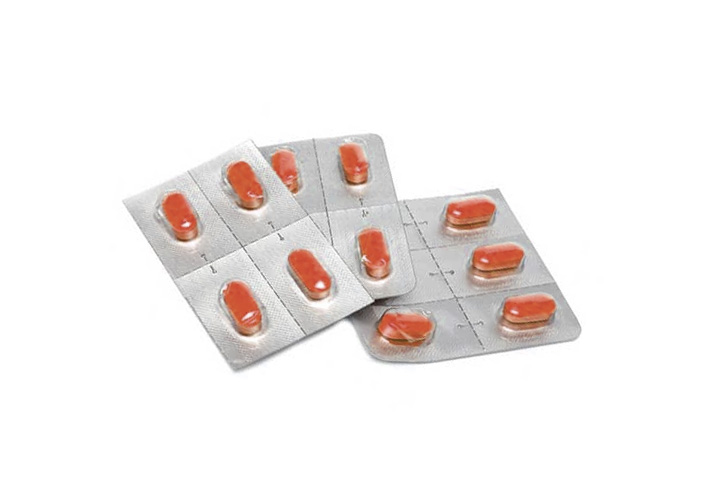Vantin
Vantin is a cephalosporin antibiotic. Its role is to fight infections caused by sensitive bacteria.
What Does Vantin Contain?

Active ingredients
1 film-coated tablet of Vantin 100 contains 100 mg, 1 film-coated tablet of Cefopodoxime 200 contains 200 mg of cefpodoxime, in the form of cefpodoxime proxetil.
Excipients
Sodium lauryl sulphate, magnesium stearate, hydroxypropyl cellulose, crospovidone, lactose monohydrate, calcium carboxymethylcellulose, titanium dioxide (E171), talc, hypromellose.
Forms and Strengths
Vantin 100: 10 and 20 film-coated tablets.
Vantin 200: 10 and 20 film-coated tablets (scored).
Uses
Vantin should be taken with meals, 2 times a day, 12 hours apart. Most indications require a treatment period of 5 to 10 days.
In adults
Usual dosage: 200-400 mg per day in 2 doses, i.e. morning and evening, as prescribed by the doctor.
In children
Children weighing over 25 kg: 1 film-coated tablet of 100 mg each morning and evening, as prescribed by your doctor.
The duration of treatment will be determined by your doctor.
Vantin is not suitable for treating children weighing less than 25 kg.
If you forget to take Vantin or take an overdose, please inform your doctor.
Do not change the prescribed dosage on your own. Contact your doctor or pharmacist if you think your medicine is too weak or too strong.
Once started, antibiotic therapy should be continued for as long as prescribed by the doctor. The symptoms of the disease often disappear before the infection is completely cured. Treatment that is too short or interrupted prematurely can cause a relapse.
Side Effects
Vantin may cause the following side effects:
Infections
Common: Superinfections caused by insensitive micro-organisms, e.g. yeasts (candida).
Blood and lymph circulation disorders
Occasional: Increase in the number of blood platelets (thrombocytosis). This change usually disappears without further intervention when treatment is stopped.
Rare: Changes in red blood cells (haemoglobin falls, anaemia and haemolytic anaemia), leucocyte count (leucopenia, leucocytosis, neutropenia, eosinophilia, agranulocytosis, lymphocytosis) and platelets (thrombocytopenia).
Immune system disorders
Rare: Hypersensitivity reactions of any severity, e.g. swelling of the face, vessels and/or larynx. Respiratory difficulties up to life-threatening shock.
Nervous system disorders
Common: headache.
Occasional: Sensation of dizziness.
Rare: Perception of abnormal sensations (paresthesia).
Cardiac disorders
Very rare cases of chest pain have been observed, which may be a sign of a potentially serious allergic reaction called Kounis syndrome.
Ear and auditory canal disorders
Rare: Tinnitus.
Gastrointestinal disorders (digestive tract)
Common: Diarrhoea, nausea.
Occasional: Vomiting, abdominal pain.
Rare: Pseudomembranous colitis with severe and/or persistent bloody diarrhoea. Cases of acute pancreatitis (inflammation of the pancreas).
Hepatobiliary disorders
Occasional: Elevation of liver values (transaminases, alkaline phosphatases) and/or bilirubin, as a sign of liver cell damage (e.g. cholestatic).
Rare: Cases of acute hepatitis (inflammation of the liver).
Skin and subcutaneous tissue disorders
Occasional: Skin changes such as skin redness, rash, urticaria, purpura and pruritus.
Rare: Cases of blistering skin reactions (erythema multiforme, Stevens-Johnson syndrome, Lyell syndrome).
Cases of severe skin reactions have been reported.
Renal and urinary disorders
Rare: Increased urinary output (blood urea and creatinine) in serum, cases of acute renal failure.
General disorders and administration site conditions
Common: Weakness such as asthenia.
Occasional: Malaise.
Important side effects and signs to watch for, and what to do if you or your child is affected:
If you notice any of the following side effects, stop taking Vantin or stop giving it to your child and seek medical advice immediately.
If hypersensitivity reactions occur, such as breathing difficulties or skin reactions.
In the event of severe or even bloody diarrhoea during or after treatment.
Proliferation of insensitive microorganisms such as yeasts (candida) may occur in particular with prolonged use of Vantin. This can lead to inflammation of the oral and vaginal mucosa and must be treated accordingly.
Precautions
Tell your doctor if you have had allergic reactions to antibiotics or if you have not tolerated Vantin well during previous treatment.
If you suffer from kidney failure, inform your doctor, who will adjust the dose of the medicine.
Particularly serious and potentially fatal skin reactions have been reported after taking Vantin. The signs of these skin reactions are:
- flu-like symptoms and fever
- skin rash
- reactions of the mucous membranes (e.g. oedema of the oral or laryngeal mucosa, formation of bullae, bleeding)
- oedema of the face or other parts of the body
- chest pain (Kounis syndrome).
If you experience these symptoms after taking Vantin, you must stop treatment and contact a doctor immediately.
Allergic reactions
Hypersensitivity and allergic reactions (e.g. rash) may already occur after the first dose of Vantin. Severe allergic reactions of the immediate type with swelling of the face, vessels and larynx (oedema) and breathing difficulties may occur very rarely, culminating in life-threatening shock (anaphylactic/anaphylactoid reactions). In such cases, Vantin should be discontinued immediately and medical or emergency treatment (e.g. shock therapy) should be instituted.
Vomiting and diarrhoea
This medicine may cause vomiting and diarrhoea, even several weeks after the end of treatment. In this case, the effectiveness of Vantin and/or other medicines (e.g. the contraceptive effect of the "pill") may be compromised. If necessary, check with your doctor or pharmacist, who will be able to recommend other measures (e.g. contraception).
In the event of severe or persistent diarrhoea or if you notice blood or mucus in your stools, stop taking Vantin immediately, as this may be a potentially fatal infection of the colon. Do not take any medicines that stop or slow down bowel movements and contact your doctor, who will institute appropriate treatment immediately.
Prolonged use or high doses
Prolonged and/or repeated use of Vantin may lead to reinfection or a second infection with insensitive (resistant) germs or yeasts.
Patients should be monitored for signs of a possible secondary infection with such pathogens (mucosal mycosis with redness and whitish deposits on the mucous membranes). Secondary infections should be treated accordingly.
Influence on laboratory tests
The Coombs test and non-enzymatic methods for detecting the presence of glucose in urine may give false positive results.
Taking Vantin with other medicines
Taking cefpodoxime at the same time as oral anticoagulants (such as Marcoumar/Sintrom) may increase the anticoagulant effect of the latter.
Reduced effect:
Concomitant use of medicines intended to reduce gastric acidity or inhibit acid secretion (e.g. antacids and H2-receptor antagonists) reduces the absorption of the active substance contained in Vantin. They should therefore be taken 2-3 hours before or after taking Vantin.
Impaired renal function:
Caution should be exercised when administering high doses of cephalosporins to patients who are simultaneously taking potent salidiuretics (e.g. furosemide) or products that may cause renal impairment (e.g. aminoglycoside antibiotics), as impairment of renal function due to such combinations cannot be excluded.
This medicine may affect reactions, driving ability and the ability to use tools or machines.
What else do you need to consider?
The antibiotic contained in Vantin is not effective against all the micro-organisms that cause infectious diseases. Using the wrong antibiotic or the wrong dose can cause complications. Never use it to treat other illnesses or other people.
When should Vantin not be taken?
In the event of known or suspected hypersensitivity (allergy) to one of the substances contained in Vantin or a known allergy to another cephalosporin antibiotic, this drug should not be administered. Allergic reactions may include asthma, breathing difficulties, circulation problems, swollen skin or skin reactions.
What Else Should I Look Out For?
Your doctor has chosen this antibiotic and not another because it is specifically suited to your case and your current infection. You should therefore not use it in the future without your doctor's advice to combat an illness that is even similar in appearance, either for yourself or for someone else.
To be effective, this antibiotic must be used regularly and without omission, in the prescribed doses, and for as long as your doctor advises. The disappearance of a fever or any other symptoms does not mean that the infection has disappeared or that you are completely cured. If you stop treatment early, a relapse could occur and your recovery could be delayed and become difficult. However, increasing the prescribed doses will not speed up your recovery.
As for any feeling of tiredness, this is not due to the antibiotic treatment, but to the infection itself. Reducing or suspending your treatment would have no effect on this feeling but would delay your recovery.
Vantin may cause dizziness and this may affect your reaction and your safety in road traffic.
Pregnancy and Breastfeeding
Vantin should only be taken on the doctor's express prescription during pregnancy and when breast-feeding.



